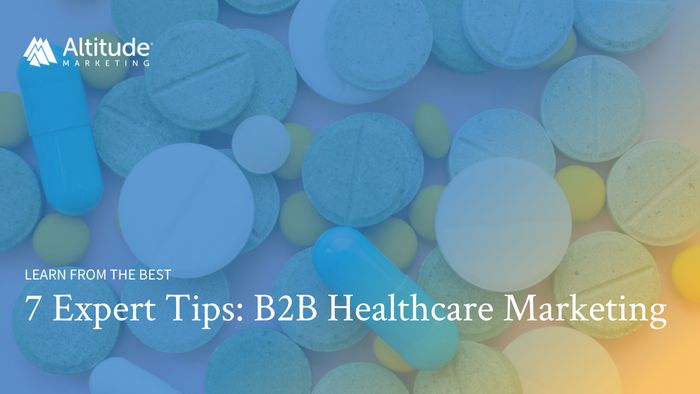Healthcare is one of the most vital industries in the world. The field – including everything from direct patient care to drug development and medical devices – is expected to grow at an average annual rate of 5.4% until 2028.
If you’re a B2B marketer looking to showcase your business in the healthcare or life sciences industries, it’s essential that you understand their unique landscape.
This guide unveils seven essential tips to help you reach your target audience, generate more leads, and increase your conversions.
Healthcare is a rapidly growing industry, and it’s important to make sure that you’re taking advantage of all the latest marketing trends that drive success. Check out these seven essential tips for B2B healthcare marketing.

Expert Tips for B2B Healthcare Marketing
- Understand your target client
- Deliver high-quality content
- Invest in SEO
- Utilize social media
- Generate leads with PPC
- Nurture leads with email campaigns
- Measure your results
Tip #1: Understand Your Target Client
The first step to effective healthcare marketing is understanding your target client. You need to ask questions like:
- Who am I trying to reach?
- What are their needs and pain points?
- What kinds of solutions are they looking for?
- How can my services help them?
If you don’t take the time to understand your buyers, your B2B healthcare marketing efforts will be scattered and ineffective.
Instead, do your research on your target audience. Actually talk to them. The healthcare and pharma industries are incredibly nuanced. Even a seemingly narrow group of targets might require a ton of variation in the messages you deliver to them.
And no, this type of work can’t just be a thought exercise. It’s critical that you conduct robust stakeholder interviews and put your prospects’ opinions into action. If you’re guessing what they need and want, you’re unlikely to hit the mark.
Tip #2: Deliver High-Quality Content
Content marketing is one of the most vital tools in a B2B healthcare marketer’s arsenal. It can help you reach your target audience and build trust with potential clients. When creating semi-technical content, it’s important to keep in mind what kind of information your target customer is looking for.
Your prospects will develop trust with your brand if you’re providing them with valuable, detailed, and relevant information. The rule is: the more detail, the better. In this field, you’re going to be dealing with any number of doctors and other folk with letters after their names. If you’re asking them to spend time with your content, you better make it worth their while.
Additionally, try to mix up the types of content that you create. A variety of content formats will keep your audience engaged and help you reach a wider customer base.
Too many brands make the mistake of relying on one type of content. A mix of blog posts, podcasts, infographics, videos, and eBooks will keep your audience interested in your brand.
Your B2B healthcare marketing content needs to:
- Engage and influence prospects
- Expand across a variety of media outlets
- Adapt according to what’s working (and what’s not)
- Address all stages of your buyers’ needs
Tip #3: Invest in SEO
It’s also important that your search engine optimization (SEO) is functional and effective, particularly if your brand or solution is new to the market. The best content in the world doesn’t do you any good if nobody can find it!
These days, that means optimizing for search. When potential customers search for information online, they use search engines. Ninety percent of all internet searches are conducted through Google, which means the search engine is your priority.
We’ve written so much about SEO in the past. Suffice to say, this isn’t about “tricking Google” anymore. The days of keyword stuffing and over-optimization are dead, dead, dead.
Instead, you need to focus on delivering real value to real people. That means useful content (like what you’re reading!) that’s worthy of backlinks, delivered on a fast, mobile-friendly website.
SEO is a complex, ever-changing topic. If it gets to be too much, there are plenty of agencies that can help. If you want your website and content to be found by potential customers, it’s important to invest in quality SEO services.
Tip #4: Don’t Forget Social Media
Social media is a great way to show credibility and build relationships with influencers in the field, like editors and reporters. When using social media for B2B healthcare marketing, choosing the right platform for your business is important.
LinkedIn is the obvious leader here. Its dataset is top notch, and basically everyone on the commercial side of healthcare is active on it. Twitter is useful, though largely as an aggregator. Facebook, Instagram, TikTok and the rest are probably iffy choice, unless you have a strategy that points to them. Who knows, maybe someone wants glamour shots of your software eating lunch near a beach?
The healthcare market is also rife with influencers – KOLs, in industry parlance. Something as small as a share from an influential account can drive any number of signups or demo requests.
Tip #5: Generate Leads with PPC
Search advertising – PPC – is another helpful method to generate leads in healthcare and pharma. When done correctly, PPC can be an effective way to reach your target audience and get them to visit your website or landing page.
Like SEO, PPC is remarkably nuanced – far more than we can cover here.
6. Nurture Your Leads With Email Campaigns
Once you’ve generated leads, it’s important to nurture them so that they eventually convert into customers. There are a few different ways to nurture your leads, but email marketing is one of the most effective methods.
You can send targeted emails to your leads that offer valuable information and resources with email marketing. You can also use it to stay in touch with your customers and build relationships with them.
We also recommend using a lead management system like ActiveCampaign to help you track and manage your leads. This will help you stay organized and make sure that you’re following up with each lead in a timely manner.
7. Measure Your Results
Finally, it’s important to measure your results so that you can see what’s working for your brand and what’s not.
You can use Google Analytics to track your website traffic, and most CRMs and pipeline management systems will allow you to track the number of leads you generate. By tracking these metrics, you’ll see which marketing activities are generating the most results and you can adjust your strategy accordingly.
tl;dr: Results-Driven B2B Healthcare Marketing
Altitude Marketing is an experienced B2B healthcare marketing agency. We’re based near Princeton and Philadelphia in Pennsylvania’s Lehigh Valley, with a presence in Chicago.
If you’re looking for help with your healthcare brand, we can help. We are a team of experienced experts who specialize in creating effective and engaging campaigns that generate leads and increase website traffic.
We would love to partner with you and help you achieve your marketing goals. Contact us today and learn more about our full-service B2B healthcare marketing offering.
Update: Frequently Asked Questions
This post has received significant interest since it went live in April 2022. Here are answers to some of the most common B2B healthcare marketing questions we’ve gotten via web forms and email.
B2B marketing is the promotion of products and services to another business. “B2B” is short for business-to-business; it’s also sometimes abbreviated B-to-B, B to B or b2b. In the healthcare arena, B2B marketing typically covers medical devices, systems for functions like asset tracking and lifecycle management, software, and services around drug development, clinical trials and commercialization.
B2B marketing is directed at another business. B2C marketing is directed at a consumer. (B2C stands for “business to consumer.”) A hybrid also exists: B2B2C marketing is the promotion of a product to a business that then sells it to a consumer.
The B2B healthcare ecosystem consists of vendors and service providers selling to other manufacturers, clinicians, physicians, hospital systems, pharmacists and others who deliver or advance care. While B2B healthcare is a lucrative space, it is ultimately about collaboration to create increased positive outcomes for patients.
An example of B2B healthcare marketing is a manufacturer selling an MRI machine to a hospital, or an asset tracking solution provider promoting rugged RFID tags to a medical device vendor.



